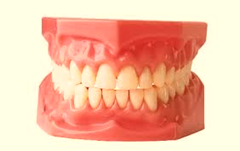 As a child, I used to think teeth were the most important part of the human body. Can you blame me? So much attention was paid to them.
As a child, I used to think teeth were the most important part of the human body. Can you blame me? So much attention was paid to them.
In first grade, I can remember the teacher demonstrating proper brushing methods using a huge set of molars and an oversized toothbrush.
One year we were asked to brush our teeth and then given a little red pill to chew; some of us were scolded when big red stains on our teeth showed we’d done a poor job of brushing.
Dental checkups came with gifts: a new toothbrush and a tiny tube of toothpaste.
Cavities were treated without delay. Parents obsessed about crooked teeth and the cost of braces, but in the end, straight teeth won out.
There was even a mythical creature dedicated to paying for lost teeth, proving to me how precious they were. As far as I can recall, teeth were my first earned revenue stream, even before an allowance.
How could we not grow up thinking our pearly whites were a vital part of the human body?
As important as teeth were in our young lives, it’s surprising how few financial and medical resources are focused on them as we get older. Medicare doesn’t provide coverage for routine dental services and only one in five Americans above the age of 75 has private dental insurance.
Geriatricians are physicians trained in the medical issues of older adults. Ever hear of a gerodentologist? No? That’s because geriatric dentistry is not a recognized dental specialty.
Maybe oral health problems are less prevalent among seniors than among younger people? Quite the opposite is true: Oral and dental diseases disproportionately affect seniors.
Beside the wear and tear and years of exposure, today’s “senior experience” negatively impacts dental health. The common side-effect of more than 500 medications taken by seniors is reduced salivary flow or dry mouth.
Dry mouth interferes with healthful eating by creating sensitive areas of the mouth, reducing our ability to tolerate spicy or acidic foods.
The juice of an orange, for example, can sting the sores that may develop in dry areas inside the mouth.
Breads and dry meats can also be difficult to chew and swallow because of a lack of saliva to moisten them.
People with dry mouth often perceive the taste of their food to be poor in general, which further reduces their appetite and overall interest in eating.
When a person has little or no saliva, cavities can progress rapidly and be challenging to treat, often resulting in tooth loss. It’s not easy to attach a bridge, which is replacing three missing teeth, to an anchor tooth that is loose.
Between 55 and 65 percent of seniors over the age of 65 have gum disease. The median age for diagnosis of oral cancer is 64.
Seniors are not only the most challenged by oral health issues, they have the least access to oral healthcare. As noted earlier, few seniors at any income level have insurance benefits to pay for dental visits. It’s even worse for seniors who are homebound, low-income or living in long-term care facilities.
There’s much we can do, even locally. Area dentists can focus on geriatric dentistry. Dental schools can focus their training on caring for homebound seniors or those in long-term care facilities. Physicians who routinely treat the elderly can bring focus to senior oral health issues.
If you’d like to learn more about senior oral health, attend the upcoming program “Can I Eat for Pleasure and Wellness?” It’s part of Senior Concerns’ Positive Aging series and will be from 5:30 to 7 p.m. Tues., March 25 at 401 Hodencamp Road, Thousand Oaks.
This interactive seminar will be presented by Lisa Weaver, M.S., R.D., director of nutrition services at Senior Concerns, and M. Natalie Dianati, D.D.S. and Kathleen Carson, D.D.S., both of Westlake Dental Arts.
To learn more about the program or to make a reservation, call (805) 497-0189.
Advance reservations are required. Light refreshments will be served.
A $10 donation is requested to cover the cost of program materials.
More ...
Tags: gerodentologist,senior oral health,dry mouth